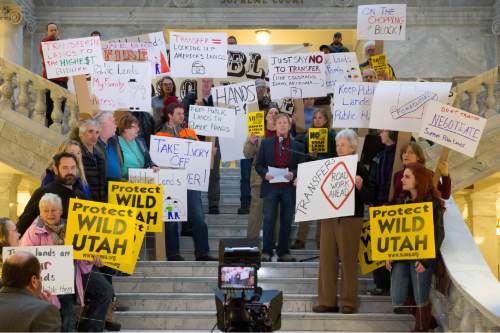This is an archived article that was published on sltrib.com in 2015, and information in the article may be outdated. It is provided only for personal research purposes and may not be reprinted.
Back in 1906, Arthur Sweet, an aspiring Carbon County coal baron, obtained title to a section of school trust land, planning to tap the rich trove of minerals under the surface. But the federal government stepped in with a lawsuit alleging the state of Utah had no legal right to sell the rights to the coal.
Courts ultimately sided with the federal government, applying to Utah a federal policy of retaining subsurface mineral resources when the government deeded land to Western states as they were admitted to the union.
Two University of Utah legal scholars are now citing the century-old court case to bolster their argument that Utah cannot legally claim the mineral riches locked in 31 million acres of public lands the state now is banking on taking from the federal government.
"These conclusions follow from well-established principles of law predating Utah's admission to the Union that excluded from grants to the states all lands known to be mineral in character. Therefore, even if the state can establish a duty to dispose of the public domain, and show that such a duty necessitates granting the land to the state, the exclusion of minerals from those grants would severely limit the economic value of the land that would be conveyed to the states," wrote John Ruple and Bob Keiter in a new white paper.
They note that mineral leasing and extraction, mostly derived from oil, gas and coal, accounted for 93 percent of revenues generated in 2013 from the public lands Utah now covets.
"Mineral title is important because Utah's best — and perhaps only — hope of covering management costs involves mineral development," wrote the scholars. "Taking on the management of millions of acres of new land without simultaneously securing a source of funding to fulfill those obligations would be contrary to the state's best interests."
The paper, titled "When Winning Means Losing," was released Monday morning as a legislative panel received a progress report from contractors it hired to help advance the goals of the Transfer of Public Lands Act, which the Legislature passed in 2012.
Transfer proponents, mostly rural county commissioners and conservative Republicans in the Legislature, say the feds have botched the management of the West's public lands at the expense of forest and range health and rural economies. The government allegedly broke a promise to "return" unappropriated lands to Western states, according to Utah leaders, who are now spending millions developing legal and lobby strategies to force the federal government to comply with Utah's land transfer law.
But critics say these efforts are counterproductive and are accomplishing little other than spurring more conflict over land management.
"It is unfortunate that the state appears committed to a legal strategy that has little chance of success, that would involve many years of costly litigation, and where a state victory would come with so many negative unintended consequences," said Keiter, director of the U. law school's Wallace Stegner Center for Land, Resources and the Environment.
Wednesday's paper was Ruple and Keiter's third weighing in on Utah's controversial land transfer proposal. The earlier papers challenged Utah's legal claim to public lands and predicted that the public would lose the ability to participate in land-use decision-making should transfer occur. Now they are saying the state would never be able to afford managing the land. This is because wresting control of these lands' mineral rights is legally untenable, according to the scholars' legal analysis.
They pointed to the outcome of the Carbon County coal dispute. By the time a court ruled, Sweet and his brothers had already developed what became known as the Hiawatha Mine. The Sweets lost the first ruling and the case ricocheted around the courts until the U.S. Supreme Court issued a final ruling in 1918 awarding title to Hiawatha minerals to the federal government.
However, on Wednesday, the state's legal consultants advised the Utah Commission for the Stewardship of Public Lands that they have concluded the federal government has no constitutional authority to "permanently" retain two-thirds of Utah's land that is now being administered by the Bureau of Land Management, U.S. Forest Service and other federal agencies.
"We are a federal republic. The central government is run by the states. The members of the republic, the states, must be equal in power and sovereignty," George Wentz, a lawyer with a New Orleans firm called Davillier Law Group. As states joined the union they were to be admitted in with the same powers as the original 13 states under doctrine know as equal footing, Wentz said.
He estimated that it would cost Utah $14 million to run a case of original jurisdiction before the U.S. Supreme Court.
Brian Maffly covers public lands for Salt Lake Tribune. He can be reached at bmaffly@sltrib.com or 801-257-8713. Twitter: @brianmaffly



